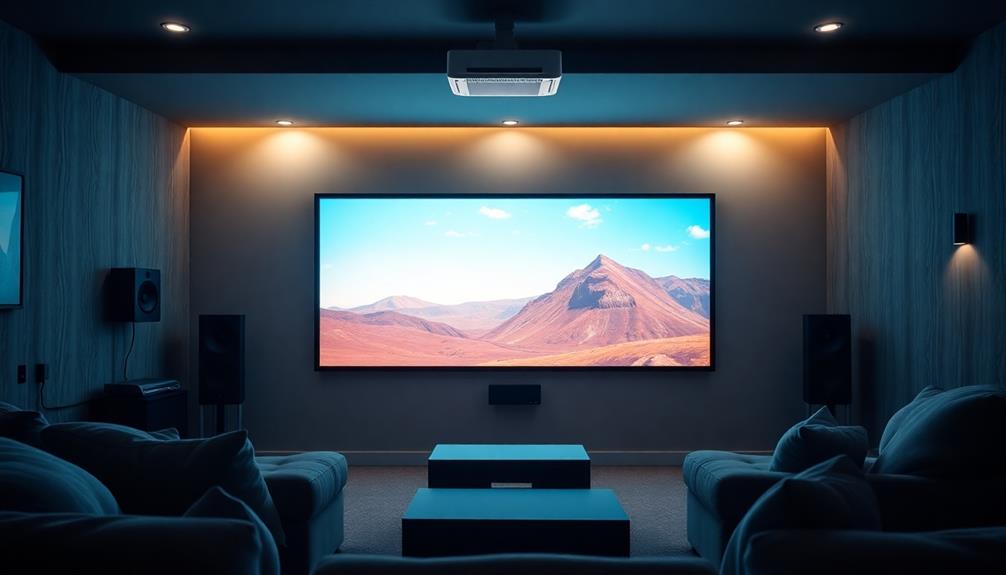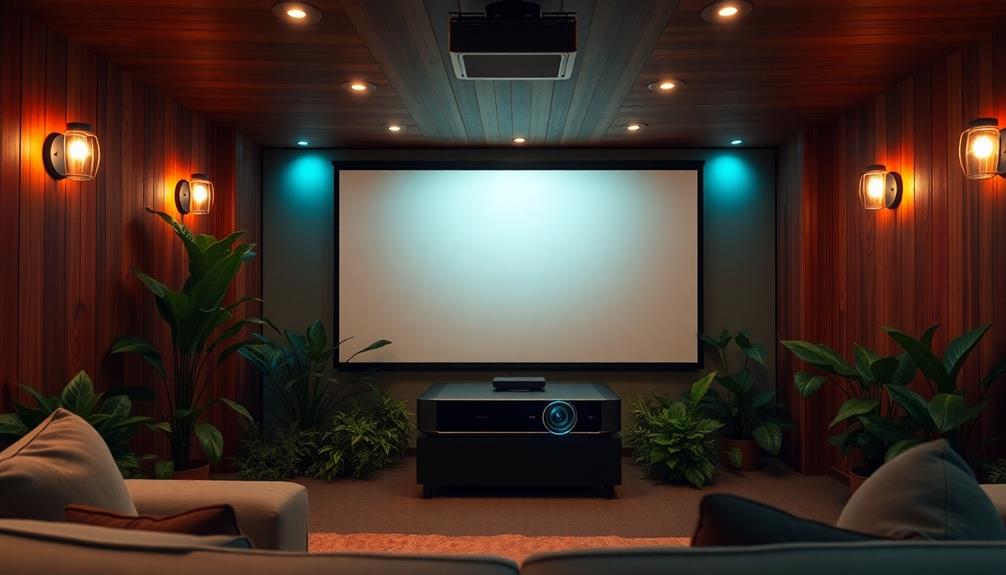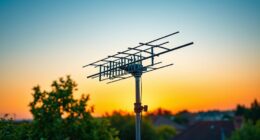To reduce power consumption in your home theater, focus on selecting an energy-efficient projector. Look for models with Energy Star ratings, as they typically use less electricity. Adjusting brightness settings based on your room's lighting can also help lower energy usage. Using eco modes can cut consumption by up to 30%, making a significant difference in cost. Remember, portable projectors usually consume less power than high-end options. Regular maintenance, like cleaning filters, can enhance efficiency further too. There's plenty more to explore about optimizing your home theater's energy use, so keep going to uncover additional tips.
Key Takeaways
- Choose Energy Star-rated projectors to ensure lower power consumption and enhanced energy efficiency.
- Use eco modes to reduce power consumption by up to 30%, extending projector lifespan.
- Adjust brightness settings based on room lighting to optimize energy efficiency without sacrificing image quality.
- Implement scheduled power management to prevent unnecessary energy draw when the projector is not in use.
- Regularly maintain your projector, including cleaning filters, to enhance performance and reduce power usage.
Understanding Projector Wattage

Understanding projector wattage is essential for choosing the right model for your needs. Projectors typically consume between 50 to 400 watts, with variations based on the type you select.
If you're considering a portable projector, you'll find that they generally use 50-100 watts, making them energy-efficient for casual use. Mid-range home theater projectors, however, usually require 150-300 watts to deliver enhanced performance, especially if you prefer higher brightness levels.
For those who want the best image quality, high-end theater projectors can exceed 1000 watts, providing maximum brightness and detail.
It's crucial to recognize that the brightness level, measured in lumens, directly impacts power consumption. Higher brightness settings demand more watts, which can increase your overall energy consumption.
When comparing projectors, you'll notice that LCD projectors typically consume more power than LED or DLP models, affecting their energy efficiency.
If you're aiming for an eco-friendly home theater setup, look for projectors that balance brightness and power consumption effectively, ensuring you enjoy stunning visuals without excessive energy use.
Factors Affecting Energy Consumption

Energy consumption in projectors hinges on several key factors that can greatly impact your overall experience.
The wattage of your projector plays a significant role; portable projectors typically consume 50-150 watts, while home theater models range from 200-400 watts, and high-end laser projectors can average between 300-600 watts.
The brightness level, measured in lumens, directly influences projectors' power. Higher brightness settings require more energy, so consider the ambient light in your room.
Larger spaces with more light may necessitate a higher lumen output, increasing power requirements.
Additionally, the type of projector technology affects energy usage. LED projectors are the most energy-efficient option, followed by DLP and LCD models, which tend to consume more power.
You can also utilize eco modes and adjust brightness settings based on your viewing conditions to reduce energy consumption by up to 30%.
Cost Implications of Projector Use

When you consider the cost implications of using a projector, it's essential to factor in both the initial purchase price and the ongoing energy expenses. Understanding the power usage and energy costs associated with different models can save you money in the long run. For instance, lower-end projectors might cost you about 1 cent for two hours of use, while high-end models can rack up costs up to 24 cents.
Here's a quick overview of potential annual energy costs based on wattage and usage:
| Projector Type | Annual Energy Cost |
|---|---|
| Low Power (200W) | $10 |
| Mid Range (400W) | $30 |
| High Power (800W) | $100 |
| Energy-Efficient Model | $15 |
| Standard Model | $50 |
Enhancing Energy Efficiency Strategies

Maximizing energy efficiency in your projector usage not only reduces costs but also contributes to a more sustainable environment. To achieve this, start by selecting projectors with Energy Star ratings, ensuring you choose models that consume less power while still delivering performance.
Activating the eco mode on your projector can reduce power consumption by up to 30% without greatly impacting image quality.
Adjusting brightness settings based on your room conditions is another effective strategy. Lowering brightness in darker environments can lead to considerable energy savings.
Additionally, consider implementing a scheduled power management system that automatically turns off your projector when it's not in use, helping to eliminate unnecessary energy draw.
Regular maintenance plays an essential role in enhancing efficiency as well. Cleaning filters and ensuring proper ventilation can prolong your projector's lifespan while also reducing power usage.
Comparing Projectors and TVs

Comparing projectors and TVs can help you make an informed choice for your home entertainment setup. When evaluating energy usage, consider that modern projectors typically consume between 150 to 400 watts, while traditional TVs range from 80 to 400 watts.
Low-end projectors can have comparable energy use to large TVs, especially in larger spaces. However, high-end projectors, particularly those supporting 4K resolution, usually require more power, averaging 350 to 500 watts.
Despite this, projectors can still consume less energy overall, especially when you utilize eco-mode settings, which can reduce power consumption by up to 30%. This makes projectors an energy-efficient option compared to many conventional TVs.
While newer LED TVs may be more efficient, projectors shine in providing immersive image quality on larger screens, perfect for home theaters.
Consider how the light source and projectors wattage impact your electricity bills, especially if you plan to watch frequently. Ultimately, your choice should balance energy efficiency and the viewing experience you desire.
Frequently Asked Questions
How Can I Reduce the Power Consumption of My Projector?
To reduce your projector's power consumption, use eco-mode settings, choose energy-efficient models, adjust brightness according to room lighting, maintain it regularly, and disconnect it when not in use to minimize standby energy costs.
How Energy Efficient Are Projectors?
Projectors' power performance varies widely, from whispering wattage in energy-efficient models to hefty high-end units. You'll find significant savings with Energy Star-rated options, especially when you utilize eco-modes and adjust brightness settings for peak efficiency.
What Uses More Electricity, a TV or Projector?
When you compare a TV and a projector, projectors often use more electricity, especially high-brightness models. However, eco-mode settings can help reduce their power consumption, making them more efficient for larger displays in some cases.
How Much Electricity Does a Projector Consume?
Ever wondered how much electricity a projector really consumes? Depending on the model and brightness, it can range from 50 to 600 watts. Keep that in mind, especially during those movie marathons you love.
Conclusion
Incorporating energy-efficient projectors into your home theater can dramatically cut power consumption and costs. Just imagine enjoying your favorite movies while knowing you're reducing your carbon footprint. With a little effort, you can create an immersive viewing experience that's easy on the wallet and the environment. So, why not make the switch and transform your movie nights into eco-friendly events? Embrace these strategies, and you won't just save energy—you'll elevate your entertainment experience!
Hi, I’m Dominique. I love movies and want everyone to have the best home cinema experience possible. That’s why I started 1home Theatre Projector. We help people build their home cinema system using the latest technology and news on laser tv and all-around home entertainment.
We’re a small team of movie buffs (and experts) who are passionate about giving our readers the best advice and information possible. So whether you’re just starting out or you’re looking to upgrade your home cinema system, we’ve got you covered!
















